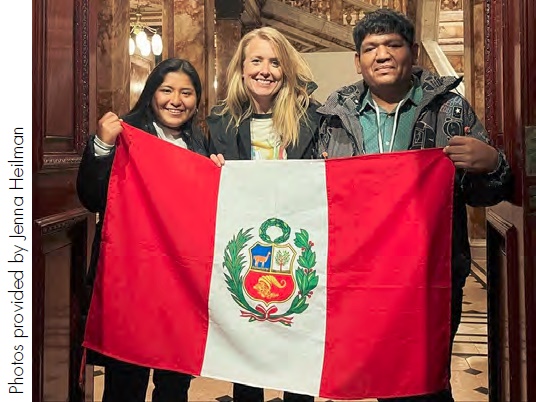
HDYO is a truly international organisation |
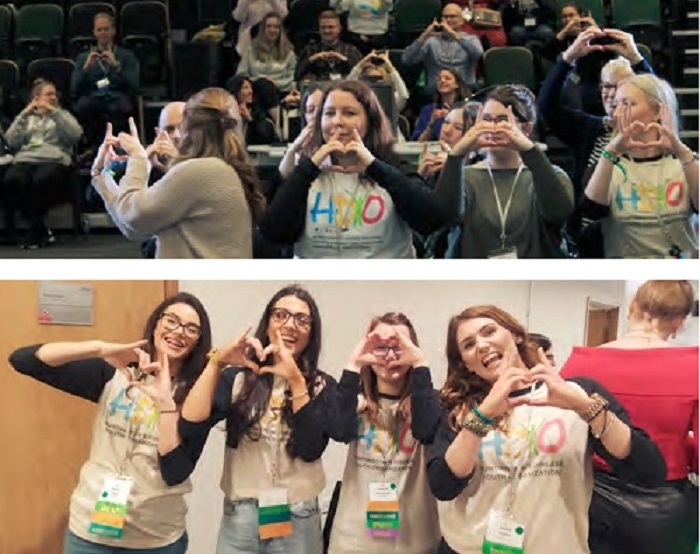
Demonstrating the Gratitude Day Logo |
Bringing About Positive Change for Young People:
An Interview with Jenna Heilman
Highlight from the: EHDN Newsletter_July2023_Issue49
Jenna Heilman is the Executive Director at the Huntington’s Disease Youth Organization (HDYO). Working with Project Coordinator and Founder Matt Ellison, Jenna has brought a whirlwind of exciting activity and new ideas to our HD community. She took a brief pause from her busy schedule to tell us about their work bringing about positive change for young people affected by HD across the globe.
Could you start by telling us about your background and how you got involved in HD?
Before HDYO, I was the Executive Director at Head for the Cure, an organisation supporting brain tumour and brain cancer research in the USA. Like many people during the pandemic, I needed to take a break from what I had been doing and of course, working in rare diseases can be really challenging for lots of reasons. Then HDYO put out the advertisement for an Executive Director – and it seemed like just too good an opportunity to miss. I was really drawn to the international focus, and the opportunity to learn more and connect with the team. At this time, I didn’t have a direct, personal connection with HD but later on, I found out that on my husband’s side of the family, we had family members both with HD and at risk of HD.
What does an Executive Director do on a day-to-day basis?
My main mission is to propel the mission of HDYO – supporting, educating and empowering young people aged 35 years and under impacted by HD. It is also to support the structure around these young people – their families, medical community, professionals,friends, and anybody who wants to learn more. While we are a really small organisation, we accomplish a lot, so I am extremely hands-on with the day-to-day operations, often meeting partners like folks at EHDN and other associations across the globe to either share the perspectives of young people, or figure out how we can collectively make a bigger impact. Such partnerships are key to fostering solutions. I also work with pharmaceutical companies and people in industry to share perspectives about the latest research news and help bridge the gap between pharmaceutical companies, communities and individuals. Our HD community is incredibly well equipped to be involved in the science and I think it’s important for pharmaceutical companies to continue to invest in this community and build trust and respect. For me, it’s really important to share the perspectives of young people and families in all of this.
How have recent clinical trial outcomes impacted your work?
In recent years, some trials haven’t panned out as hoped. At HDYO, we focus on the useful information that emerged – a trial never really fails, it just hasn’t met its goal, and there are always takeaways from that. Empowering people through education has been really important and the resiliency of the HD community, especially young people, has continued to amaze me, along with their thirst for knowledge and eagerness to engage in the next steps. Whether at risk, having tested positive, or having loved ones directly affected by HD, our community remains hopeful for an effective treatment and welcomes the opportunity to get involved in clinical trials. As an observational study, Enroll-HD is a good way to begin and allows individuals to share their voices and engage with the research process.
How does HDYO progress education?
We have an amazing Ambassador programme to help advance education and resources. Now, we have more than 60 ambassadors
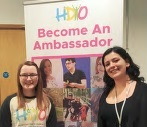 |
across the globe and our role is to help them develop as leaders. We provide training every other month and host a very active WhatsApp chat where individuals support each other and provide content that’s most impactful |
for the age group. This is all part of our strategy for developing and managing programmes to give young people affected by HD a voice that can be heard.
Our International Young Adults Congress held in Glasgow earlier this year was the first international event of its kind. It was incredibly empowering to meet in a community, in person, especially after COVID-19. We tried to create an event that was a bit different to the others and for the content to be specifically driven by the community. Our ambassadors were key in identifying the important topics and sessions that proved critical to the success of the congress. We also worked with our pharmaceutical partners to help break down the science to ensure that it was accessible to the community and could make clear the importance of getting involved in research.
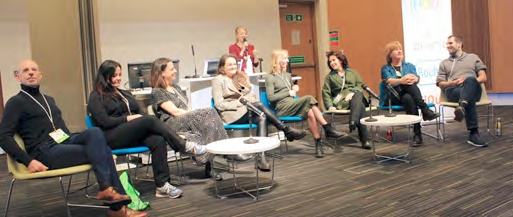
Ask the experts at the first International Young Adults Congress in Glasgow
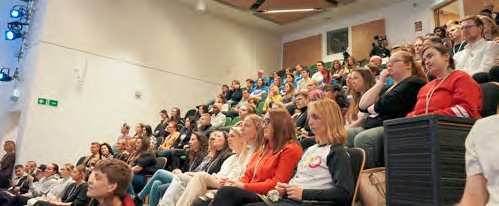
An attentive audience at the International Young Adults Congress
What we saw and what we heard was simply overwhelming – to be in a room with more than 300 people where HD didn’t need to be explained but you could just be yourself was amazing. You didn’t have to be an outward advocate for the whole community… you could just share your story and be understood. That was incredibly powerful for all of us. The feedback we received showed that participants valued the safety of the event, and by that, I mean they felt safe approaching people and at the same time, being able to share their own stories. You can watch the recorded sessions here.
‘Empowering people through education has been really important and the resiliency of the HD community, especially young people, has continued to amaze me …’
I’m thrilled that we were able to offer 100 scholarships from HDYO and several other associations sent members, families and young people through their own programmes as well. We will continue to strive to target the communities that don’t have access to care and support, and to keep growing each and every year to ensure that we truly offer international representation and opportunity.

What plans do you have for the future with HDYO?
The programme for ambassadors and the next congress will be our key focus but we are also working on our educational programmes and associated components. To this end, we recently launched our first survey, with the aim of better understanding our community. To begin, we are looking at how people search for resources and support. This is an ethically approved, international survey open to anyone aged 18 or older and impacted by HD. After that, we will look at different social and research-based stigmas around HD, the milestones of life and those associated with HD, and the support that is currently available.
We are currently in the process of launching HD STRIVE, which stands for Supporting and Training International Voices to Excel. This is an online, membership platform for people working in a wide range of various roles to support young people impacted by HD. We also hope to start offering continuing education opportunities in which we connect to the international community while also encouraging people to start supporting young people if they don’t already have programmes in place. At our congress, we spoke with professionals to hear about what would be most beneficial to them and we’re working on those nuts and bolts pieces right now.
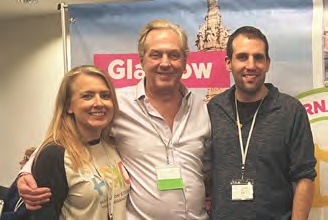
Jenna Heilman with Charles Sabine and Matt Ellison
‘We will continue to strive to target the communities that don’t have access to care and support, and to keep growing each and every year to ensure that we truly offer international representation and opportunity.’
Finally, I’d like to mention ‘Huntington’s Disease Heroes: Inspiring Stories of Resilience from the HD Community’. This is a collection of stories from more than 20 advocates across the UK and much further afield. We have a chapter explaining the need for HDYO and how we’ve evolved our services to address young people impacted by HD. It’s a fantastic learning resource for everyone, and for scientists who don’t have the opportunity to go to meetings and conferences, it is a great way to hear snippets of people’s powerful stories. It’s available on Amazon and as we’re the charity partner, 50% of the proceeds come back to HDYO.

